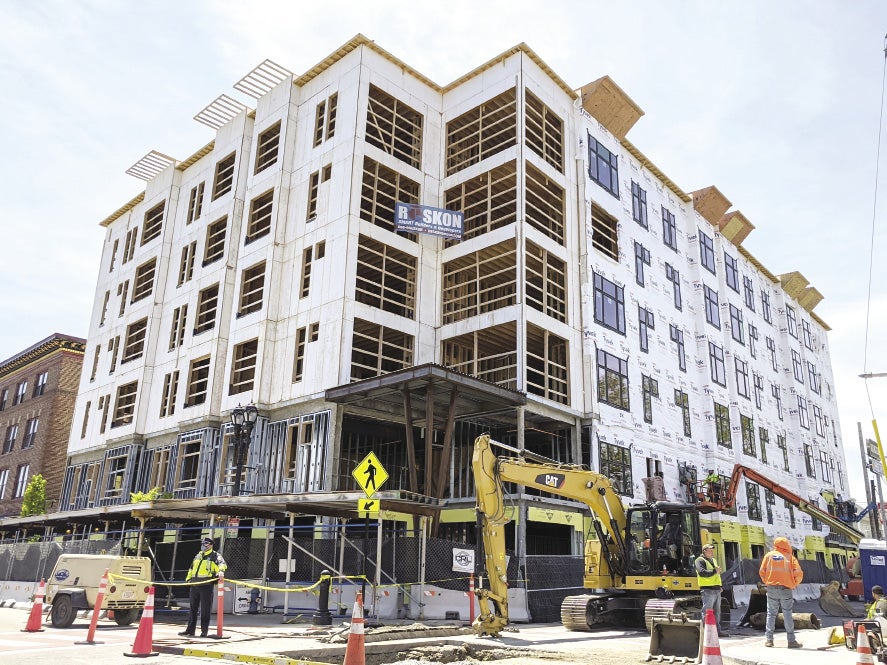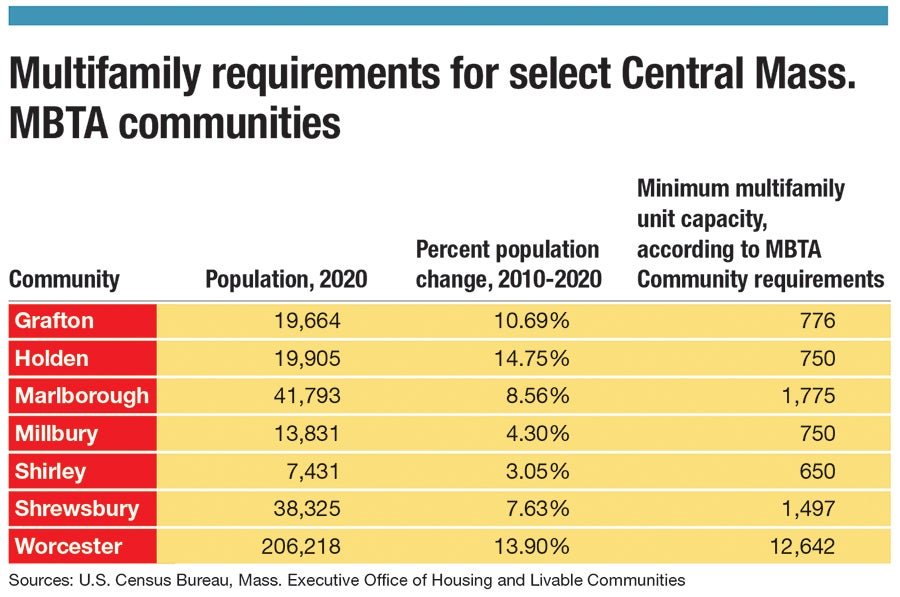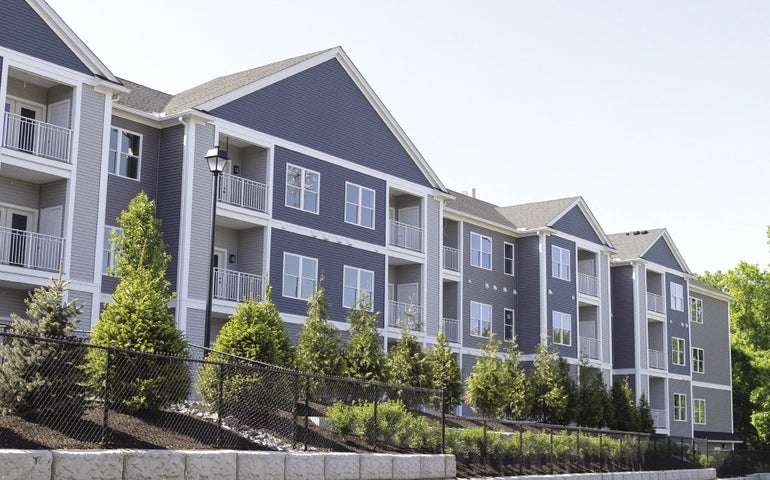Multifamily residential developers have been proposing thousands of apartments throughout Central Massachusetts, but communities are resisting the push for more housing to protect their resources and what residents and officials see as their town’s character.
Get Instant Access to This Article
Subscribe to Worcester Business Journal and get immediate access to all of our subscriber-only content and much more.
- Critical Central Massachusetts business news updated daily.
- Immediate access to all subscriber-only content on our website.
- Bi-weekly print or digital editions of our award-winning publication.
- Special bonus issues like the WBJ Book of Lists.
- Exclusive ticket prize draws for our in-person events.
Click here to purchase a paywall bypass link for this article.
Rice Road in Millbury is a tree-lined two-lane street between Providence and South Main streets. Driving toward Grafton on Providence Street, one could easily miss the entrance to the road, just past the oil company ckSmithSuperior.

To enter the road, a driver must slow down and turn right 135 degrees, immediately mounting a hill and crossing train tracks. Rice Road itself is made up of primarily modest ranch-style homes.
It is here, at 17 Rice Road, where developers have proposed a 192-apartment complex, the development that led to a vote to suspend multifamily development in Millbury for 18 months.
Multifamily residential developers have been proposing thousands of apartments throughout Central Massachusetts, many market-rate, some income-restricted affordable, and a few luxury. They have been aided by local tax breaks and state money in an effort to increase housing inventory to meet demand and to increase affordability.
State measures like Part I, Title VII, Chapter 40B of the Massachusetts General Laws and the Multi-Family Zoning Requirement for MBTA Communities encourage development in communities resistant to multifamily projects, in an effort to address a shortage of inventory in housing, especially affordable housing, which has led to skyrocketing rents and housing prices around the state.
Yet, some communities are resisting the push for more housing to protect their town’s resources and what residents and officials see as their town’s character.
Building housing is a priority for the Gov. Maura Healey Administration. Healy created a new secretariat, the Executive Office of Housing and Livable Communities, and chose former Worcester City Manager Edward Augustus to lead the office.

“We need to bring that sense of urgency that the governor and lieutenant governor have talked about, and so my mantra will be ‘More, faster,’ because the need is immediate. The need is profound,” Augustus said at his June 1 swearing-in ceremony, according to State House News Service.
Resisting affordable complexes
The push for more housing is not new. Chapter 40B is a state statute, enacted in 1969, which enables local zoning boards of appeals to approve affordable housing developments under flexible rules if at least 20-25% of the units have long-term affordability restrictions and if less than 10% that community’s housing is considered affordable, according to the Executive Office of Housing and Livable Communities. It reduces local barriers to development of affordable housing.
Towns around Central Mass. like Grafton, Shirley, and Shrewsbury are eligible for 40B projects, while Marlborough and Worcester, with a higher percentage of affordable housing, are not.
In Shrewsbury, Westborough developer Pulte Homes of New England proposed a 300-unit 40B condominium community off of Route 20 called Emerald Run. Mark Mastroianni, entitlement manager at Pulte Homes, said during a Select Board meeting in February the developer was pursuing a 40B development because the zoning of the site was not conducive to the development.
The proposal was met with resistance by the Select Board, who discussed trying to reach a compromise with Pulte in order to avoid a 40B development.
“We know there’s an extreme need for diverse housing and affordable housing,” Beth Casavant, vice chair of the Shrewsbury select board, said at the February meeting. “But, also thinking through the impact of 30 three-bedroom units [dictated by the 40B program] and minimizing that if possible.”
The Millbury moratorium
In Millbury, Whitney Street Home Builders of Southborough, owned by developers Steven Venincasa and James Venincasa, proposed 46 condominium units in 23 duplexes at 17 Rice Road in 2021. The Town’s planning board denied the proposal in February 2022. The developer returned in May 2022 with another, larger proposal under the state’s Chapter 40B program, which can allow developers to bypass some local restrictions.
The Town executed an agreement with the developer in October to go forward with the project as a Local Initiative Program project, sometimes called a friendly 40B, to give the Town greater discretion over the project.
The development, large for a town like Millbury, along with other residential developments including Venincasa projects Cobblestone Village Apartments on Howe Avenue and the 19 Canal Apartments, prompted Millbury resident Steven Stearns to propose an 18-month moratorium on multifamily development in the town, according to a March 16 op-ed by Stearns in the Millbury-Sutton Chronicle.
“This will provide time to review and amend certain zoning bylaws related to multifamily dwelling units throughout Millbury,” Stearns said in the op-ed.
Stearns said he and the petition signatories were not against all development.
“We support safe, appropriate, and responsible development that doesn’t compromise public safety, complies with local regulations, and contributes to a sustainable tax base. Unfortunately, the [Rice Road] proposal currently under consideration by the town and state doesn’t meet those criteria,” he wrote.
At the May 3 annual Town Meeting, two-thirds of the 149 voters in attendance voted for the 18-month moratorium, which would end in November 2024. The measure is with the Office of the State Attorney General’s Municipal Law Unit to be reviewed for its legality, with a decision expected by middle of August. The Mass. Executive Office of Housing and Livable Communities is also reviewing the moratorium vote, to see if it applies to the Rice Road project.
Millbury is not the only Central Massachusetts community to enact a moratorium on multifamily development.
In March 2020, a citizens’ petition and a proposal from City Councilor Christine Long requested the City of Framingham put a moratorium on multifamily buildings, after 1,400 housing units were proposed between August 2016 and February 2020.

In a June 2020 memorandum, the City Planning and Community Development staff determined a moratorium would be arbitrary and unnecessary. Nonetheless, in September 2020, the City Council voted to adopt a nine-month moratorium, overriding a veto by then Mayor Yvonne Spicer.
In May 2021, the council extended the moratorium for three additional months. A report by Framingham SOURCE said some councilors felt that the goals of the moratorium – to review and study the effects of multifamily development and to develop policies based on those studies – were not met, with some blaming Spicer for the lack of progress.
Since the Framingham moratorium ended, hundreds of additional apartments have been proposed in the city.
Cracking down on MBTA communities
Another state government tool for increasing housing in smaller communities is the Multi-Family Zoning Requirement for MBTA Communities, enacted in 2021. This law requires 177 communities, either served directly by the Massachusetts Bay Transportation Authority through rapid transit or commuter rail or abutting communities directly served by the MBTA, have at least one district where multifamily housing is permitted as of right.

Each district should be of reasonable size, without age restrictions, suitable for families with children, and have a minimum density of 15 units per acre.
“The lack of zoning for multifamily housing is a barrier for new housing development in Massachusetts. By allowing multifamily housing near transit, we can create new housing in walkable neighborhoods closer to transit. This is not just good housing policy, it is good climate and transportation policy, too,” the Massachusetts Executive Office of Housing and Livable Communities writes on its website.
As originally written, communities not complying with the law would lose out on funds from the Housing Choice Initiative, the Local Capital Projects Fund, and the MassWorks Infrastructure program.
After some towns, including Holden, did not comply with the law by submitting an action plan, Massachusetts Attorney General Andrea Campbell issued an advisory in March, saying communities cannot avoid the law by foregoing the funding and may face civil enforcement action.
“MBTA Communities that fail to comply with the Law’s requirements also risk liability under federal and state fair housing laws. The Massachusetts Antidiscrimination Law and federal Fair Housing Act prohibit towns and cities from using their zoning power for a discriminatory purpose or with discriminatory effect,” Campbell wrote in the advisory. “An MBTA Community may violate these laws if, for example, its zoning restrictions have the effect of unfairly limiting housing opportunities for families with children, individuals who receive housing subsidies, people of color, people with disabilities, or other protected groups.”
Whether it’s residents who fear change to their home or municipalities feeling strong-armed by state government officials, there will be friction as governments and developers try to solve the Massachusetts housing shortage and affordability crisis.
“We need to think creatively. The same old isn't going to get us where we want to go. And so we need to be creative, and we need to be open-minded to a lot of different ideas that maybe previously we weren't open minded to,” Augustus said at his swearing-in ceremony.
Timothy Doyle is the WBJ Real Estate Insider, covering all things related to property in Central Massachusetts. Reach him at tdoyle@wbjournal.com.

